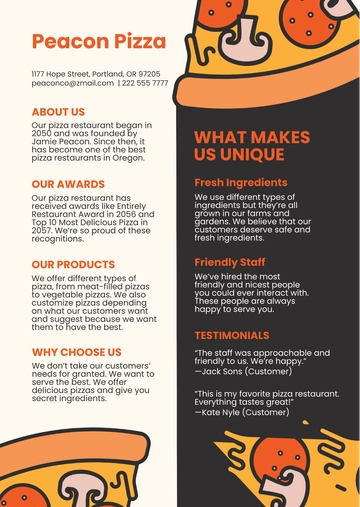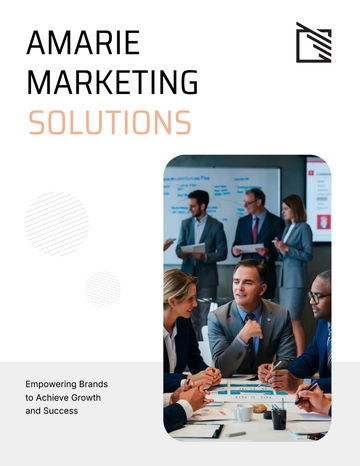Free Advertising Campaign Portfolio

Campaign Overview
Title: "Innovate with [Your Company Name]"
Duration: [January 2051 - December 2051]
1. Objectives:
Increase Brand Awareness: Boost brand recognition by [%] through a mix of targeted advertising and public relations initiatives. This objective is vital to position [Your Company Name] as a leader in the tech industry.
Boost Online Sales: A [%] increase in online sales is targeted by leveraging digital marketing and enhancing the e-commerce experience. This goal aligns with expanding [Your Company Name]'s market share in the tech sector.
Enhance Customer Engagement: Increase interactions across digital platforms by [%], focusing on customer loyalty and brand advocacy. This aims to strengthen [Your Company Name]'s relationship with its consumer base.
2. Key Messages:
Innovation at the Core: [Your Company Name]’s commitment to cutting-edge technology will be the focal point, emphasizing its role in advancing the tech industry.
Quality and Sustainability: The portfolio will highlight the sustainable practices of [Your Company Name] and its dedication to superior quality in product manufacturing.
Customer-Centric Approach: Demonstrating how [Your Company Name] tailors its offerings to meet the evolving needs of its customers will be a key narrative.
3. Campaign Phases:
Phase 1 (Jan - Apr [Year]): The initial phase will focus on building brand awareness through digital marketing and strategic public relations.
Phase 2 (May - Aug [Year): The middle phase will concentrate on driving sales through targeted promotions and enhanced online advertising techniques.
Phase 3 (Sep - Dec [Year]): The final phase will be dedicated to ramping up customer engagement through interactive campaigns and innovative social media strategies.
4. Target Audience Analysis
Demographics:
Age Group: Primarily targeting individuals aged [age-age], identified as a demographic with significant purchasing power and interest in technology.
Income Bracket: Those earning $[Amount] - $[Amount] annually, who are likely to invest in quality tech products.
Location: Focusing on major urban centers in the United States, where tech adoption and use are most prevalent.
Psychographics:
Interests in Technology: This audience demonstrates a strong interest in the latest technological advancements and industry trends.
Social Media Activity: Highly active on various platforms, these individuals are key influencers in their social circles regarding tech choices.
Values: A focus on sustainability and quality aligns this group with [Your Company Name]’s commitment to these principles.
Behavioral Insights:
Online Shopping Habits: This demographic is known for its frequent online purchases and responsiveness to digital advertising.
Content Consumption: Preferring engaging and informative content, this group is a regular visitor to tech blogs and forums.
Brand Loyalty: Exhibits loyalty to brands that consistently deliver quality, innovation, and align with their values.
5. Target Audience Personas:
Persona 1: Tech-Savvy Professional
Age: 30-40
Interests: Staying abreast of tech trends and seeking products that enhance professional and personal efficiency.
Goals: To be at the forefront of adopting new technology and maintaining an efficient, tech-driven lifestyle.
Persona 2: Eco-Conscious Consumer
Age: 25-35
Interests: A strong interest in sustainability and investing in products that reflect a commitment to environmental responsibility.
Goals: To make informed choices that favor eco-friendly and sustainable tech products, supporting brands that reflect these values.
6. Campaign Strategies
Content Marketing:
Objective: Engage the audience with high-quality, relevant content that highlights [Your Company Name]'s expertise in technology.
Approach: Develop a content calendar that includes a mix of articles, infographics, and videos to maintain a consistent and engaging online presence.
Platforms: Leverage [Your Company Website] and partner websites for broader content dissemination and increased reach.
Measure of Success: Track the increase in website traffic and the average time spent on the site to gauge the effectiveness of the content strategy.
Social Media Campaigns:
Objective: Build a strong, engaging brand presence on key social media platforms to foster community and customer loyalty.
Strategy: Create a mix of scheduled posts, impromptu live sessions, and interactive campaigns to maintain a dynamic and engaging social media presence.
Target Platforms: Select platforms based on where the target audience is most active, ensuring optimal engagement and impact.
Key Metrics: Monitor the growth in followers, analyze engagement rates, and track the conversion rates resulting from social media activities.
Email Marketing:
Objective: Cultivate a lasting relationship with the existing customer base and nurture potential leads through regular communication.
Method: Design and distribute a monthly newsletter that offers exclusive content, product updates, and special offers.
Target Audience: Segment the email list to deliver personalized content to various customer groups, enhancing the relevance and effectiveness of the communications.
Success Indicators: Analyze open and click-through rates to refine email content and strategies continuously.
SEO and PPC Advertising:
Objective: Achieve higher visibility in search engine results and drive targeted traffic to [Your Company Name]'s website.
SEO Strategy: Implement ongoing SEO audits and optimizations to ensure high visibility and organic search traffic.
PPC Campaigns: Design and execute PPC campaigns that are highly targeted, with a focus on conversion optimization.
Metrics: Regularly review search engine rankings, analyze PPC campaign performance, and adjust strategies for maximum ROI.
7. Media Mix
Digital Media (60%):
Allocation: $[Amount]
Components: A balanced mix of various digital channels is planned to ensure comprehensive coverage and engagement.
Rationale: Digital media's targeting capabilities and measurable outcomes make it a cornerstone of the campaign, aligning with the tech-savvy nature of the target audience.
Television (20%):
Allocation: $[Amount]
Strategy: Develop compelling TV ads that resonate with the target audience, airing during peak viewing times for maximum exposure.
Purpose: Leverage television's wide reach to build brand credibility and supplement digital marketing efforts.
Print Media (10%):
Allocation: $[Amount]
Selection: Carefully choose publications that align with the audience's interests and values for targeted print advertising.
Goal: Utilize print media to reach an audience segment that values detailed, in-depth information presented in a traditional format.
Outdoor Advertising (10%):
Allocation: $[Amount]
Method: Implement strategic placements of billboards and transit ads in key urban locations to maximize visibility.
Objective: Complement digital and traditional media strategies by creating high-impact visual brand reminders in everyday spaces.
8. Budget Allocation
Digital Media:
Allocation: $[Amount]
Details: This segment covers extensive digital marketing efforts including social media ads, content creation, SEO, and PPC campaigns.
Justification: Given the digital-savvy nature of the target audience, investing heavily in digital media ensures maximum reach and engagement.
Additional Initiatives: Part of this budget will also be allocated towards influencer partnerships and interactive online campaigns to further drive engagement.
Future Projections: Anticipate reallocating funds based on real-time performance analytics, ensuring maximum impact and flexibility in strategy.
Television:
Allocation: $[Amount]
Details: Funds allocated for TV include production costs for high-quality commercials and prime-time slot purchases.
Justification: TV ads provide a broad reach and are effective for building a strong brand image.
Strategic Planning: Commercials will be scheduled during programs popular with the target demographic to maximize exposure.
Evaluation: TV ad performance will be monitored through consumer surveys and increase in website traffic post-airing.
Print Media:
Allocation: $[Amount]
Details: Budget is for placing advertisements in selected national tech and lifestyle magazines.
Justification: Print ads cater to a segment of the target audience that appreciates in-depth, tangible information sources.
Design Focus: Emphasis will be on creative, visually appealing ads that stand out in print media.
Tracking Impact: Effectiveness will be gauged through direct response mechanisms like QR codes and unique URLs.
Outdoor Advertising:
Allocation: $[Amount]
Details: Investment in strategically located billboards and transit ads in key cities.
Justification: Outdoor ads act as constant physical reminders of the brand, enhancing overall campaign visibility.
Location Analysis: Ads will be placed in high-traffic areas that are frequented by the target demographic.
Measurable Outcomes: The impact of outdoor advertising will be assessed through brand recognition surveys in the targeted areas.
9. Performance Metrics
Website Traffic:
Objective: Increase overall traffic to [Your Company Website] by [%].
Metrics: Track key indicators like unique visitors, page views, and session duration to assess website engagement.
Justification: A significant increase in web traffic is a clear indicator of successful online marketing efforts.
Additional Analysis: Use heat maps and user journey analytics to understand visitor interactions and optimize the website experience.
Long-Term Goals: Aim to convert website traffic into leads and eventually, loyal customers.
Social Media Engagement:
Objective: Boost likes, shares, comments, and overall engagement by [%] on social media platforms.
Metrics: Evaluate follower growth, engagement rates, and content performance using platform-specific analytics tools.
Justification: High engagement rates are essential for building a community and enhancing brand loyalty on social media.
Content Strategy: Regularly refine social media content based on engagement data to maintain a dynamic and responsive social media presence.
Influencer Impact: Collaborate with influencers to amplify reach and engagement, monitoring the effectiveness of these partnerships.
Sales Growth:
Objective: Target a [%] increase in online sales attributable to the advertising campaign.
Metrics: Analyze sales data, conversion rates, and the direct impact of marketing efforts on revenue growth.
Justification: Sales growth is the ultimate measure of the campaign's effectiveness in driving business results.
Customer Journey Tracking: Implement tracking mechanisms to understand the impact of various touchpoints on the customer's decision to purchase.
Adaptation and Optimization: Continuously optimize sales strategies based on real-time data and customer feedback.
Customer Feedback:
Objective: Maintain a positive feedback rate of [%] in customer surveys and online reviews.
Metrics: Regularly monitor and evaluate customer reviews, conduct surveys, and collect feedback across platforms.
Justification: Positive feedback is indicative of successful brand perception and high levels of customer satisfaction.
Response Strategy: Implement a robust system for addressing customer feedback, ensuring continuous improvement in service quality.
Reputation Management: Monitor and manage the online reputation of [Your Company Name], responding promptly to customer queries and concerns.
10. Case Studies
Case Study 1: "Revolutionizing Home Tech"
Campaign Duration: [Months]
Outcome: Achieved a [%] increase in online sales and a [%] increase in website traffic.
Strategy: This campaign centered around showcasing [Your Company Name]'s innovative home technology products using a blend of digital advertising and influencer partnerships.
Key Tactics: Leveraged social media platforms for in-depth product demonstrations, and optimized website content for better search engine rankings.
Customer Engagement: Hosted interactive online webinars and live product demos, encouraging direct customer interaction and feedback.
Feedback: Post-campaign surveys indicated high customer satisfaction, significantly boosting brand recognition in the home technology sector.
Innovative Approach: Introduced augmented reality experiences in ads, allowing customers to visualize products in their homes.
Long-Term Results: This campaign not only drove immediate sales but also established a foundation for sustained growth in the home tech market segment.
Case Study 2: "Sustainable Tech Solutions"
Campaign Duration: [Months]
Outcome: Resulted in a [%] increase in brand awareness and a [%] rise in the number of returning customers.
Focus: Emphasized [Your Company Name]'s commitment to sustainability, highlighting eco-friendly tech solutions through various media channels.
Media Channels: Utilized a strategic mix of print and digital media to effectively reach a diverse audience interested in sustainable technology.
Community Outreach: Collaborated with environmental organizations for joint promotional events and initiatives, enhancing community engagement.
Long-Term Impact: Successfully positioned [Your Company Name] as a frontrunner in the sustainable technology field, cultivating a loyal and environmentally conscious customer base.
Innovative Partnerships: Partnered with eco-friendly influencers and bloggers to amplify the campaign's reach and authenticity.
Sustainability Metrics: Introduced a sustainability index on the website, tracking and showcasing the environmental impact of [Your Company Name]'s products, further solidifying the brand's commitment to eco-friendly initiatives.
11. Contact Information
[Your Company Name]
Address: [Your Company Address]
Phone: [Your Company Number]
Email: [Your Company Email]
Website: Visit [Your Company Website] for more information on our products and services.
Social Media: Follow us on [Your Company Social Media] for the latest updates and exclusive content.
Customer Support: Contact our customer support team for any inquiries or assistance regarding our products and services.
Media Inquiries: For press and media-related inquiries, please reach out to our public relations department at [Your Company Email].
- 100% Customizable, free editor
- Access 1 Million+ Templates, photo’s & graphics
- Download or share as a template
- Click and replace photos, graphics, text, backgrounds
- Resize, crop, AI write & more
- Access advanced editor
Showcase your creative prowess with the Advertising Campaign Portfolio Template from Template.net. This template offers a professional layout with editable features from our AI editor tool to present your advertising campaigns, highlighting your creative concepts, execution, and results. Download this template to build a compelling portfolio that demonstrates the breadth and success of your advertising work.















